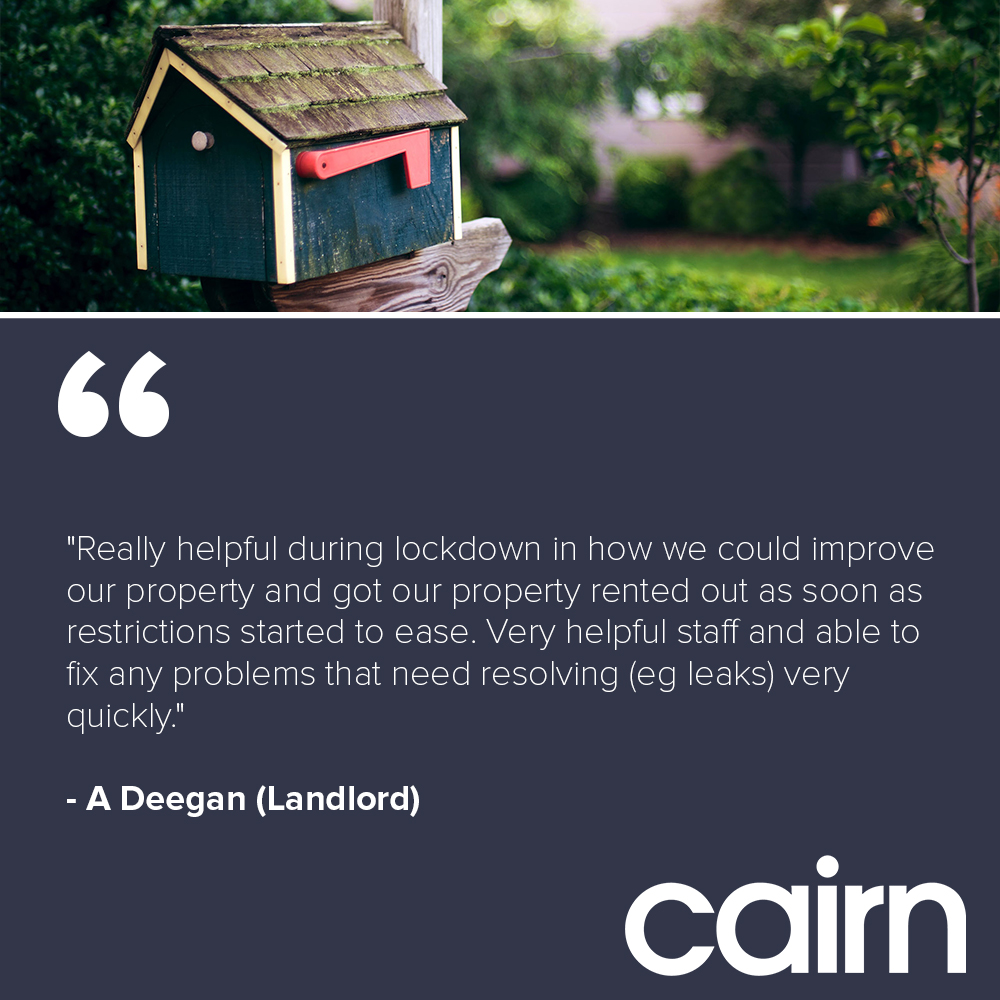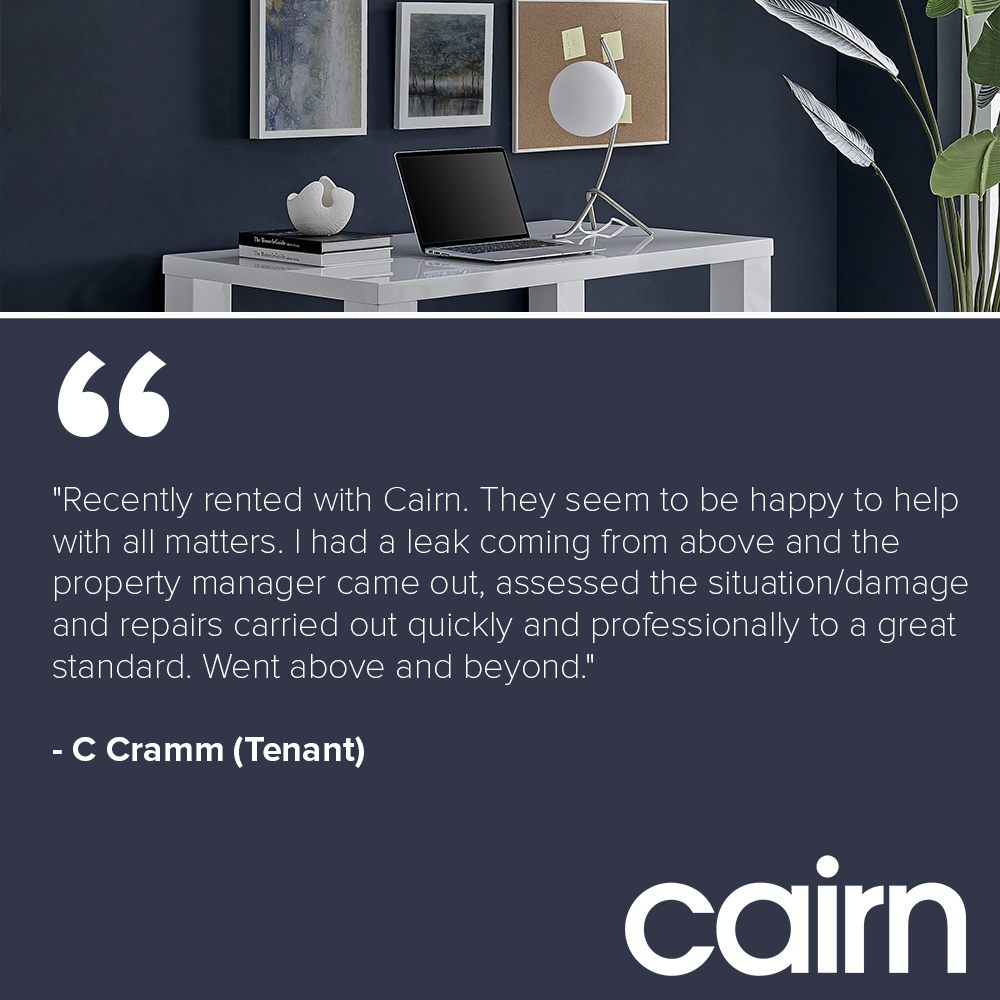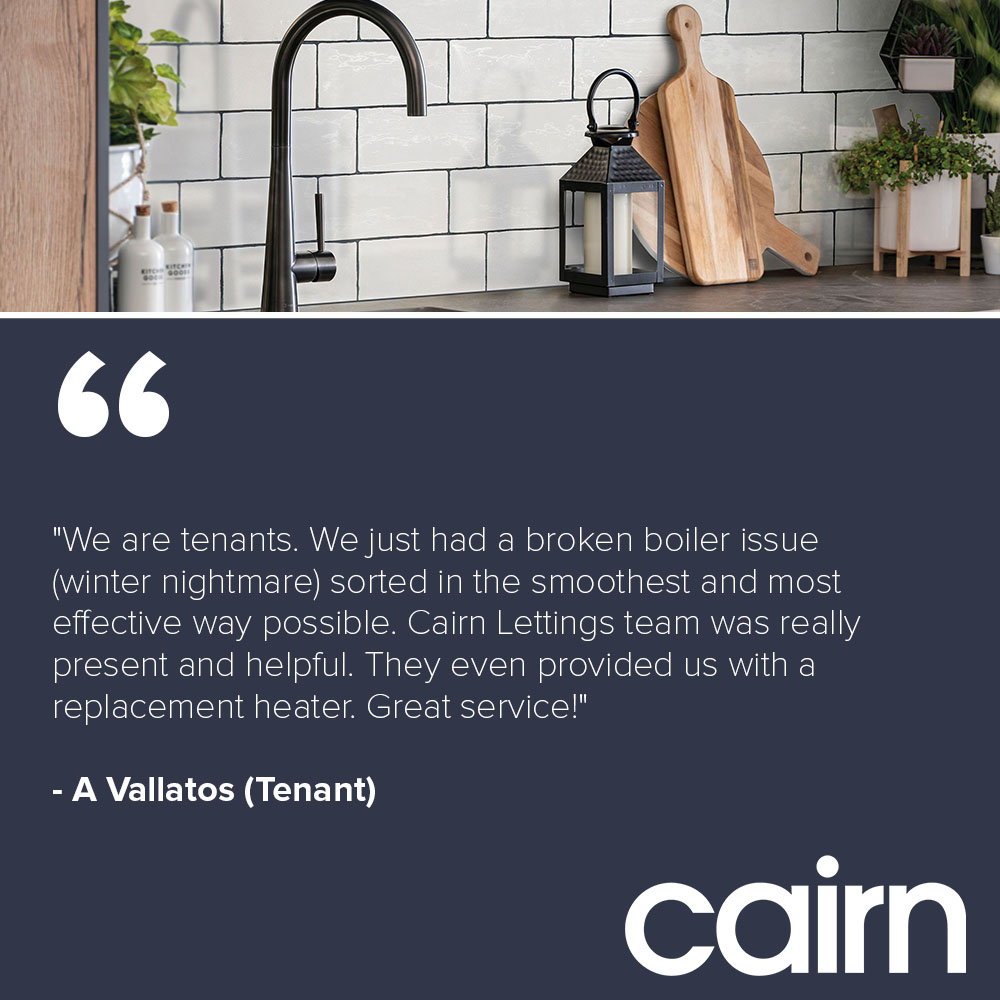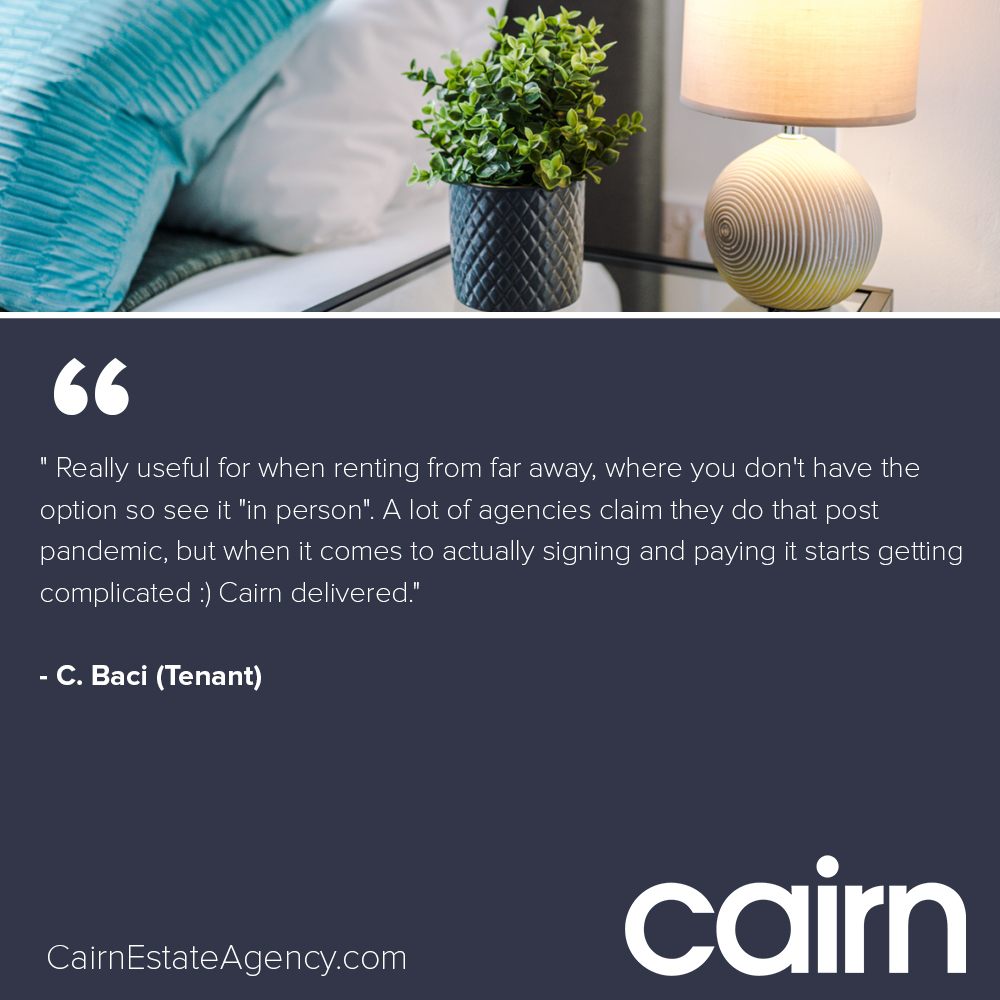Careers
Why join Cairn ?
The key to Cairn’s success is its people and its commitment to high quality and personal customer service. There are lots of opportunities within Cairn, from working within letting, estate agency, property investment or development. From maintenance to finance, property management to viewing agent.
If you share a commitment to personal service and professionalism and are keen to develop your expertise in property please contact jillian@cairnestateagency.com
Cairn pride ourselves with a robust training programme in association with Letwell and ARLA to ensure our staff are continually developing and keeping up-to-date with the current legislation.
In addition we run quarterly training courses with key note speakers such as Elspeth Boyle from Landlord Accreditation Scotland and various surveyors and property professionals.
Read & scroll through our latest property testimonials here:







































![August A[25]](https://cairnestateagency.com/assets/uploads/2025/09/August-A25.jpg)
The latest property news & information from a trusted source.
Careers, Edinburgh, Landlords, Letting, Meet The Team, News, Property Careers, Property Management, Property Managers, Recruitment, Staff
Meet the team – Ailsa Freeman-Barnes MARLA – Property Manager Edinburgh
Describe your role in one sentence at Cairn? With 10 years’ experience, I manage a diverse portfolio across Edinburgh and the Lothians, delivering operational excellence, regulatory compliance, and high service standards for clients and tenants. What’s the best thing about working at Cairn? The team is what makes this company special, their […]
Property Management
Property Management in Scotland: The Standards Every Landlord Should Expect
Property Management in Scotland: The Standards Every Landlord Should Expect Property management in Scotland has evolved significantly over the past decade. Regulatory requirements are stricter, tenant expectations are higher, and landlords face increasing compliance responsibilities. For landlords in Glasgow and Edinburgh, choosing the right letting agent is no longer simply about marketing a property. It is about ensuring legal protection, financial consistency, and long-term asset care. With over 25 years of experience operating in the Scottish rental market, we understand what professional letting and property management should genuinely include. Why Experience in the Local Market Matters The Glasgow and Edinburgh rental markets behave differently from many other parts of the UK. Tenant demand fluctuates by postcode. Student cycles influence availability. Regulatory expectations under Scottish legislation require careful oversight. An effective letting agent must understand: Current rental values at street level Tenant demand across platforms such as Rightmove, Citylets, Lettingweb and OnTheMarket Local authority licensing requirements Scottish tenancy law and notice procedures Without this depth of knowledge, landlords risk void periods, compliance issues, or incorrect rent positioning. What a Fully Managed Service Should Deliver A fully managed service should provide end-to-end oversight of your property investment. It is not simply about finding a tenant. A professional fully managed service should include: Accurate rent appraisal supported by live market data A tailored marketing strategy Unlimited accompanied viewings Thorough tenant referencing, including guarantor checks where required Lease preparation in line with Scottish regulations Rent collection and structured arrears management Access to a landlord portal for transparency Routine inspections and documented compliance checks Coordination of maintenance and vetted contractor management Handling of all tenant communication, notices, and dispute resolution In practice, this means landlords have a dedicated Property Manager acting as a single point of contact. It removes uncertainty and ensures accountability. For many landlords, particularly those with multiple properties or limited time, this structure protects both income and long-term property condition. What Tenant Find Only Should Cover Tenant Find Only services remain suitable for experienced landlords who wish to self-manage but require professional marketing and screening. A robust Tenant Find Only service should include: Professional rent appraisal Strategic marketing across key property portals Unlimited accompanied viewings Comprehensive tenant referencing through an independent provider such as Let Alliance Lease preparation Collection of first month’s rent and deposit Formal handover of documentation for landlord lodging and ongoing management This structure ensures the tenancy begins correctly, with due diligence properly completed. Bespoke Management Packages Not every landlord fits neatly into a standard package. We have recently delivered bespoke arrangements that combine: Tenant Find Only Rent collection Routine inspection services This hybrid approach suits landlords who want control but still require professional financial oversight and property monitoring. The key is flexibility without compromising compliance. Compliance and Regulation: The Non-Negotiable Element Scottish letting legislation continues to tighten. Landlord registration, safety certification, tenancy documentation, deposit protection and formal notice procedures must be handled correctly. Professional property management is not simply administrative. It is regulatory risk management. For landlords operating in Glasgow and Edinburgh, full legal and compliance support should be viewed as essential rather than optional. A Proactive Approach to Property Management Reactive management creates problems. Proactive management prevents them. Routine inspections identify issues early. Clear tenant communication reduces disputes. Structured arrears processes protect rental income. Effective letting agents do not wait for problems to escalate. They monitor. They document. They act early. Frequently Asked Questions What is the difference between fully managed and tenant find only? Fully managed includes ongoing rent collection, inspections, maintenance coordination and tenant communication. Tenant Find Only covers marketing, referencing and tenancy setup before handing management to the landlord. Is fully managed property management worth it? For many landlords, yes. It reduces compliance risk, protects rental income and ensures professional handling of tenant issues. Can I customise a letting package? Yes. Bespoke packages combining tenant find, rent collection and inspections are increasingly common. Do letting agents handle legal compliance? A professional letting agent should support landlord registration, safety certification compliance and correct tenancy documentation under Scottish law. Choosing the Right Letting Agent in Glasgow and Edinburgh Property management is not simply about convenience. It is about safeguarding your investment in an increasingly regulated environment. With over two decades of experience in the Glasgow and Edinburgh rental markets, we provide structured, transparent and hands-on letting services designed around long-term property performance. If you are reviewing your current management arrangement or entering the rental market for the first time, we are always happy to discuss which service structure best suits your property and your goals.
Edinburgh, Letting
Experienced Letting Agents in Edinburgh: 26 Years of Professional Property Management in the Capital
Experienced Letting Agents in Edinburgh: 26 Years of Professional Property Management in the Capital Edinburgh’s rental market is one of the most competitive and regulated in Scotland. High tenant demand, premium rental values and evolving legislation mean landlords cannot afford uncertainty. For over 26 years, we have operated as experienced letting agents in Edinburgh, supporting landlords across the capital with structured, compliant and hands-on property management. Our role is not simply to market property. It is to protect long-term investments within a changing regulatory environment. That experience matters. A Quarter Century in the Edinburgh Rental Market Edinburgh has changed significantly over the past two decades. New build developments have expanded the city’s boundaries. Professional relocation demand has grown. Student cycles remain a defining factor in certain postcodes. Short-term rental regulation has altered supply levels. Legislative reform has reshaped tenancy structures. Operating continuously through these shifts provides perspective. We have managed property through market highs and slower cycles. We have adapted processes as Scottish tenancy law evolved. We have refined compliance procedures as standards tightened. Experience in Edinburgh is not about how many properties are listed. It is about understanding how the capital behaves over time. What Defines an Experienced Letting Agent in Edinburgh An experienced letting agent in Edinburgh should demonstrate: Long-term presence within the Scottish property sector Working knowledge of Edinburgh’s distinct rental zones Clear understanding of current Scottish tenancy legislation Robust tenant referencing procedures Transparent rent collection processes Documented inspection and compliance systems Professional letting is a framework, not an advertisement. At its core, it combines accurate rental appraisal, structured marketing exposure, careful tenant selection and ongoing management oversight. Each stage must be recorded, accountable and compliant. Understanding Edinburgh’s Local Market Dynamics Edinburgh does not operate as a single rental market. The West End and Stockbridge attract professional tenants seeking central convenience. Marchmont and Bruntsfield are shaped by academic calendars. Leith continues to evolve, with regeneration influencing rental growth. New developments on the city’s outskirts serve a different demographic entirely. Effective property management in the capital requires postcode-level awareness. Rental values can vary street by street. Demand cycles shift with university terms and corporate relocation patterns. Without this local knowledge, properties risk being mispriced or marketed ineffectively. Compliance in Scotland’s Regulatory Environment Scotland’s private rental sector operates under distinct legislation. Landlord registration, safety certification, deposit protection and tenancy documentation must be handled correctly. Notice procedures are prescribed. Documentation must meet statutory requirements. In Edinburgh, where regulatory scrutiny is high, compliance is not optional. It is fundamental to protecting both landlord and tenant interests. An experienced letting agent should provide structured legal and regulatory support as part of standard management practice. This reduces exposure to disputes and protects rental continuity. Professional Property Management in Practice Professional property management extends beyond tenant placement. It includes: Detailed rent appraisal based on current market evidence Strategic marketing exposure across major portals Accompanied viewings and structured tenant screening Formal lease preparation in line with Scottish law Rent collection and arrears monitoring Routine property inspections Coordination of maintenance through vetted contractors Clear communication handling and dispute resolution Landlords benefit from having a dedicated Property Manager who understands both the property and the broader market context. This structure provides continuity. It reduces reactive management. It safeguards rental income. Credibility Built on Consistency Reputation in Edinburgh’s property sector is built over time. A letting agency operating for over 25 years demonstrates operational stability. It shows the ability to adapt to legislative reform, market change and shifting tenant expectations. Credibility is reinforced through: Transparent processes Consistent compliance standards Clear communication Proactive property oversight For landlords, this translates into reduced risk and structured asset management. Why Experience Still Matters in the Capital Edinburgh remains one of Scotland’s strongest rental markets. Demand is healthy, but regulation is firm. Tenants are informed. Expectations are higher than ever. Selecting experienced letting agents in Edinburgh means choosing professional oversight, not just marketing exposure. For landlords seeking stability, clarity and long-term property performance in the capital, experience is not a marketing phrase. It is a safeguard. If you are reviewing your current letting arrangements or entering the Edinburgh rental market for the first time, we are always happy to discuss how structured, compliant property management can support your investment. Frequently Asked Questions What makes a letting agent experienced in Edinburgh? Long-term operation within the capital, deep understanding of local rental zones and consistent compliance with Scottish legislation. Why is compliance particularly important in Edinburgh? The city operates within Scotland’s regulated tenancy framework, and scrutiny is high. Proper documentation and safety standards are essential. Is Edinburgh still a strong rental market? Yes. Tenant demand remains robust across many postcodes, though values and demand cycles vary by area. How does professional management protect landlords? Through structured rent collection, routine inspections, legal oversight and proactive communication handling.
 Out of Office Hours
Out of Office Hours Glasgow 0141 270 7878
Glasgow 0141 270 7878







